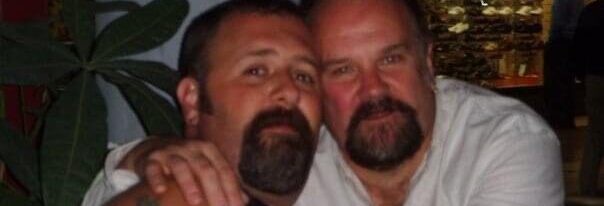
02 Jul 2025
Brian looks back on the devastating roller coaster of husband Brendan’s treatment
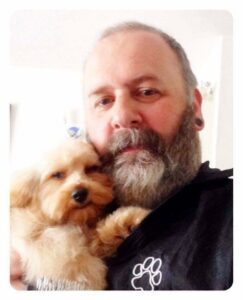
Brendan with dog Valerie
“It was without doubt the worst day of my life, facing the possibility of losing the person who was my whole life and had been for 29 years.”
Despite initially rallying from gruelling leukaemia chemotherapy treatment and a stem cell transplant, Brendan Hulse-Lewis was unable to fight his blood cancer and died in 2024 at the age of 53. Here his husband Brian talks about his loss and the roller coaster of hope and despair.
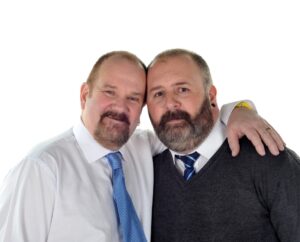
Brendan with husband Brian
“Brendan was feeling weak and worn out – like he had flu that wouldn’t go away,” said Brian, 72, who lives in the West Midlands. “He was a self-employed dog groomer and was finding it really difficult to lift the dogs. He was well built and strong, but became so weak quite quickly.”
After a month of symptoms, Brendan decided to ask the doctor for a general MOT. But on the day of his appointment, Bredan was too weak to go so phoned to cancel.
“Ten minutes later, the GP rang us and told us in no uncertain terms to get there straight away. I will always be grateful for that. They did a blood test and told us that we needed to go to A&E immediately.”
Brian drove Brendan straight to their local A&E, where Brendan was given another blood test, then told he had an anomaly in his blood. Brendan was told to get to Wolverhampton New Cross Hospital, so, with a five hour wait for an ambulance, Brian once again drove Brendan to the hospital.
On 27th November 2023, Brendan was diagnosed with acute myeloid leukaemia (AML) with the FLT3 mutation.
“He’d been admitted to ward C35 and I looked it up and it was for cancer treatment, so I had a suspicion. But even so, when it was confirmed the next day it was the biggest shock of my life. You just don’t think it’s going to happen to you – it always happens to someone else. It was without doubt the worst day of my life, facing the possibility of losing the person who was my whole life and had been for 29 years.”
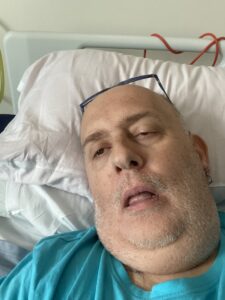
Brendan in hospital
Brendan’s treatment started immediately, with intravenous chemotherapy and Midostaurin, an oral drug.
During his first round of chemo, Brendan experienced a deep red rash over his lower body and constant nausea. He lost 20kg, his hair and the beard he’d had since he was 22.
Brendan returned home after his first round of treatment in January 2024 and seemed much like his old self. His second round of chemo also appeared to go smoothly. But after the third round, he developed infections, then sepsis.
“I sat with him until the doctors sent me home and I thought, ‘that’s it, I’m not going to see him again,’ but they phoned me three hours later to tell me he was through it and getting better.”
Brendan went into remission after his third round of chemo, but to give him the best chance of staying in remission, he would need a stem cell transplant. A donor who was an almost perfect match was found – a 21-year-old in Germany. Brendan was scheduled for the ‘conditioning’ needed ahead of the transplant – strong chemotherapy and total body radiation treatment to kill off his own immune system.
But the first appointment was cancelled, then the next two. The couple were told it was because of administration problems.
In August 2024, Brendan finally underwent his conditioning treatment and received his donor cells.
“The chemotherapy was very brutal and knocked him out. But after twenty-one days we were told it had been a success, the cells had engrafted and he could go home. He would have to go back to hospital every week for blood tests, but he was well and it was a happy, hopeful time.”
But, tragically, it was not to last. Just 35 days after his stem cell transplant, Brendan grew weaker again. A routine blood test showed that Brendan was anaemic.
The following morning, Brian drove Brendan to hospital for a blood transfusion. He immediately started to improve and the doctors said Brendan’s appointment would take six hours, so Brian drove the hour’s journey back home.
“Ten minutes after I got into the house Brendan rang me and said I needed to come back. I asked him why and he said he’d tell me when I got there. I said, ‘no, tell me now.’ He’d been told the cancer had come back aggressively and he had four to six weeks to live. I was completely broken.”
There was a chance Brendan’s life could be extended by up to six months with the drug Gillertinib, which he was immediately given.
“We pinned our hopes on it, but it didn’t make any difference. He spent seven days in hospital and then we brought him home. Everyone helped me look after him – my daughters, neighbours and the local nursing team.”
Brendan died on 22nd October 2024 with Brian and his family around him.
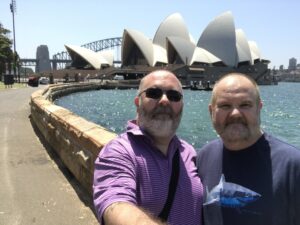
Brendan and Brian in Sydney
“We’d been together for twenty-nine years. We had a civil partnership in 2010 and then as soon as gay marriage was legalised in England in 2014, we got married at the register office in Lichfield. It was a wonderful day, the weather was glorious, there was a park full of beautiful flowers next to the register office and everyone was there.
“Brendan made so many friends in hospital and I’ve kept in touch with some. Two have had their stem cell transplants and are doing brilliantly. Of course I wish that was Brendan, but I’m pulling for them now. One of them, Ruth, did a 2km walk to raise money in memory of Brendan and we had t-shirts with his face printed on them.
“To any family that’s got someone with leukaemia, I would say keep asking questions of the doctors. They come out with so many long names and gave me reams of literature but I just couldn’t take it in. If you don’t understand something, ask, because that’s part of their job.”
Share your story
We want to help people tell and share the leukaemia stories that matter – stories like Doreen’s and stories like yours.
Related posts
3 July 2025
Together we are changing lives – Here’s how your support is making it happen
At this point in our advocacy journey, we wanted to share an update to you, our supporters, on everything we’ve achieved so far and what’s next as we continue to…
21 May 2020
A new clinical trial announced
A study into the impact of severe covid-19 infection on patients who receive stem cell transplants for blood cancers and blood disorders.
15 June 2018
Nick Boles’ Ambulatory Care Unit opening speech
An edited extract of the speech Nick Boles MP made at the official opening of the Leukaemia UK Ambulatory Care Unit.
5 December 2022
John Goldman Fellowships for 2023 now open
Leukaemia UK is delighted to announce that we are funding more ground-breaking research in 2023, by continuing our investment in early career scientists and clinicians for our prestigious John Goldman…